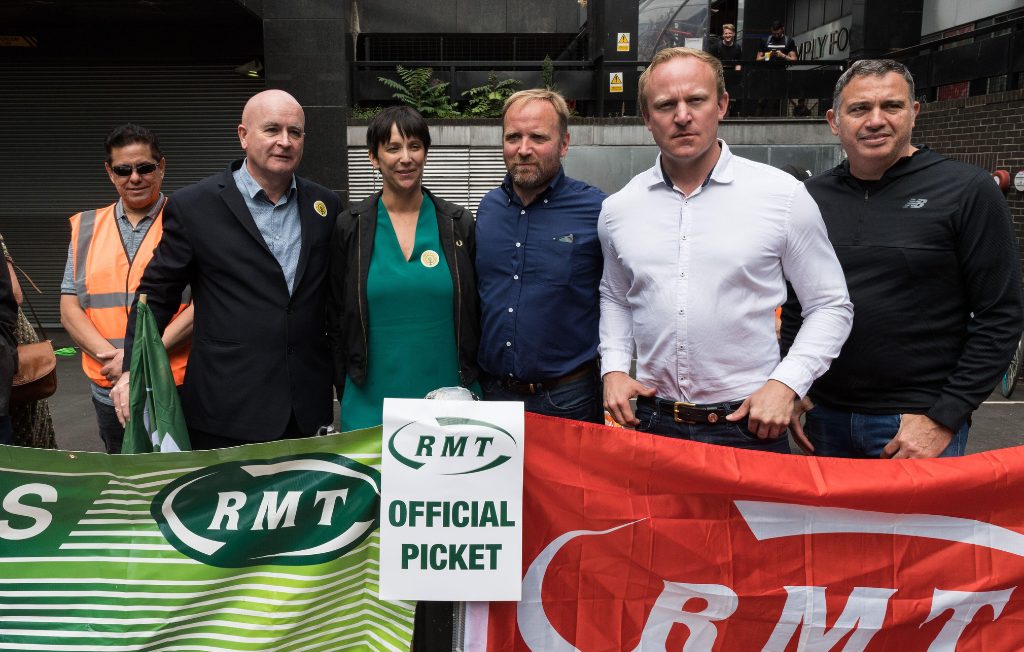Keir Starmer vs. the unions
Labour leader criticised for sacking frontbencher who joined rail strike picket line

A free daily email with the biggest news stories of the day – and the best features from TheWeek.com
You are now subscribed
Your newsletter sign-up was successful
Trade union leaders have condemned the sacking of shadow transport minister Sam Tarry hours after the frontbencher joined striking rail workers on a picket line in London.
Keir Starmer had “made clear” during last month’s rail strikes that he would not be joining the picketers and that “he expected his frontbench team to stay away, too”, The Guardian reported. The Conservatives had “spent weeks somewhat desperately attempting to blame” the Labour leader for the walkouts by RMT members, the paper said.
But while Starmer’s ban “appeared to be an attempt to prevent the Tories gaining any more ammunition”, he is now in unions’ firing line instead.
The Week
Escape your echo chamber. Get the facts behind the news, plus analysis from multiple perspectives.

Sign up for The Week's Free Newsletters
From our morning news briefing to a weekly Good News Newsletter, get the best of The Week delivered directly to your inbox.
From our morning news briefing to a weekly Good News Newsletter, get the best of The Week delivered directly to your inbox.
Why was Tarry sacked?
Deputy leader Angela Rayner “risked a split” with Starmer when she “signalled her support” for striking rail workers in June, said the London Evening Standard. And despite a note from Starmer’s office telling frontbenchers to avoid picket lines, “several senior Labour figures – including Scottish leader Anas Sarwar and Kate Osborne – showed their solidarity by posting pictures of themselves alongside striking workers on social media”, the paper reported.
Yesterday, as the row about pay and working conditions continued, Ilford South MP Tarry also took a stand by joining striking rail staff outside London’s Euston station. Tarry, a member of the Transport Salaried Staffs’ Association (TSSA), told Channel 4 News that “if I lose my job for standing shoulder-to-shoulder with rail workers, then so be it”.
He was sacked hours later. But according to The Times, the MP was axed for “doing media interviews without approval, rather than joining the picket line”.
A Labour Party spokesperson said: “This isn’t about appearing on a picket line. Members of the frontbench sign up to collective responsibility. That includes media appearances being approved and speaking to agreed frontbench positions.”
A free daily email with the biggest news stories of the day – and the best features from TheWeek.com
Whatever the reason, Tarry’s sacking has been met with fury from unions. The MP told LBC’s Ben Kentish that he had “fielded phone calls from seven different general secretaries” who were “absolutely fuming about what has happened”.
“They are now on a direct collision course with the Labour Party leadership, and that was totally avoidable,” said Tarry.
How have unions responded?
RMT general secretary Mick Lynch told Times Radio that Tarry's sacking marked a “sad day for the Labour Party”.
The TSSA said the union was “ashamed” of Starmer’s actions. General secretary Manuel Cortes said: “We expect attacks from the Tories, we don’t expect attacks from our own party.”
Gary Smith, the GMB union's general secretary, tweeted that it was a "huge own goal" for Labour to "turn a Tory transport crisis into a Labour story", reported the BBC.
And Sharon Graham, leader of Unite the Union, said Labour was "becoming more and more irrelevant to ordinary working people".
What next for Starmer?
Starmer’s relationship with the unions was “already strained”, said The Times. He “continues to struggle with the left-wing baggage he inherited from Jeremy Corbyn’s time at the Labour helm”, said The Telegraph. Now, the party has “descended into open warfare” with unions, said The Times.
Some on Labour’s left might take a “quasi-religious position” that sees unions as “sacred objects, ones beyond criticism”, said Steven Fielding, professor of political history, in The Spectator. Indeed, Starmer’s “apparently strict neutrality” has “given rise to all manner of teeth gnashing and wailing” from the left of the party, but the “discontent extends beyond the usual suspects”.
The “growing rift between organised labour and its party” is that “much of the leadership’s political strategy is dictated by the question: ‘What would Tony do?'”, said Tom Peters, former political advisor to Labour, writing at left-leaning Novara Media. Breaking from trade unions “was a key plank” of New Labour’s ideology, and Starmer seems to believe it is “an essential step on his path to government”.
But “contradiction” between Labour’s “public pronouncements of support” for workers while it distances itself from the unions “is unsustainable”. For Starmer to “navigate the tricky terrain before him”, he “must end this stand off” and work with “his greatest asset: organised labour”.
“The real test” for Starmer, said The Telegraph, will be “his handling of the rail strikes altogether”. The unions “power and influence” over Labour “remain strong because the party needs their money”.
But the party leader “also needs the votes of those being inconvenienced by the stoppages”.
Julia O'Driscoll is the engagement editor. She covers UK and world news, as well as writing lifestyle and travel features. She regularly appears on “The Week Unwrapped” podcast, and hosted The Week's short-form documentary podcast, “The Overview”. Julia was previously the content and social media editor at sustainability consultancy Eco-Age, where she interviewed prominent voices in sustainable fashion and climate movements. She has a master's in liberal arts from Bristol University, and spent a year studying at Charles University in Prague.